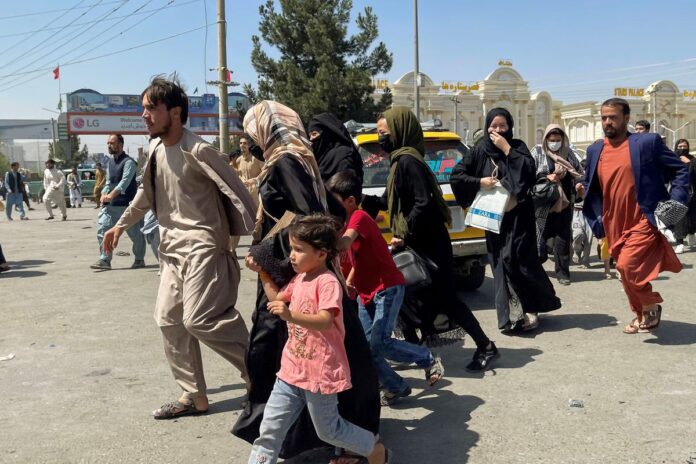LONDON: More than half of the 311 Afghans known to have been left behind by British forces during the withdrawal from Afghanistan, but who were promised sanctuary in the UK, are still in trapped in the war-torn country — with some claiming that the true number could be in the thousands.
Many of the interpreters and other Afghans who worked with Britain during its mission in the country, as well as their families who were pledged safe haven under the UK’s Afghan Relocations and Assistance Policy, now say they live in fear of Taliban reprisals after the militant group captured Kabul in August.
Ministers have been accused of “trying to move on” from the crisis, despite a recent Human Rights Watch Report claiming that Taliban forces were hunting down and killing hundreds of ex-Afghan government and military figures.
UK Prime Minister Boris Johnson admitted in September that Afghans had been left behind by Operation Pitting, the UK’s mission to evacuate people from the capital Kabul in August, adding that the government would “do absolutely everything” it could to “ensure that those people get the safe passage that they deserve.”
Earlier this month, James Cleverly MP, minister of state for the Middle East and North Africa, confirmed that 167 Afghans eligible for the ARAP scheme were still in Afghanistan, with others eligible for refuge in the UK still in designated third countries.
“Helping all those who want to leave Afghanistan and who are eligible to come to the UK remains a priority. The government has made clear to the Taliban the need to ensure safe passage of those entitled to go to another country,” Cleverly said, adding: “The ARAP scheme remains open.”
On Thursday, the UK Home Office revealed that the Afghan Citizens Resettlement Scheme, which was meant to aid 20,000 people fleeing Afghanistan from August, would not be up and running until January 2022.
Multiple former interpreters told The Independent newspaper they are living in hiding with their families. One said his ARAP application had been approved, but that he and his family were instructed to go to Pakistan, which they were unable to do without passports.
“We’re staying with relatives in Helmand,” he said. “There is high risk. It’s very dangerous here. Every day we’re threatened by the Taliban. They’re searching for us. We’re hiding. We’re not going out. It’s a bad situation.
“I don’t know why the ARAP team is working so slowly. Why are they not paying attention to us? We are eligible, we are waiting. There is no good chance of life. It is clear that our lives are in danger. We will die, we will be killed.”
Johnny Mercer MP, the former UK defense minister, told the paper he believed that the numbers could be much higher than reported.
“We have left thousands behind, not 167,” he said. “Those (167) are simply the ones who had a response to the ARAP program. Those figures are simply the number who were called forward but didn’t make it to the airport.
“The point is the ARAP program was so ineffective that thousands of people who we should have rescued didn’t even get a response from them, and consequently we have left the vast majority of people that we owed extraction to behind.
“Many are now fearing for their lives. All the ministers know this, but they are determined to move on from our commitments to these people,” he added.
Earlier this month, a former UK Foreign, Commonwealth and Development Office employee, Raphael Marshall, revealed that during Operation Pitting, a breakdown in communication and weaknesses in the system had led to thousands of requests for assistance from within Afghanistan being ignored by overworked FCDO staffers, with some of those asking for help later killed by the Taliban.
Dr Sara de Jong, co-founder of the Sulha Alliance, told The Independent she was in touch with hundreds of Afghans eligible for relocation.
“Many of the people we are in contact with are in hiding and have left their homes. They have little means to sustain themselves. If they do not already have a passport, it is hard to get it at the moment,” she said.
She told the paper about the case of one Afghan who worked as a guard at the UK Embassy in Afghanistan, one of the many who was left behind, who told the Sulha Alliance: “The Taliban can come to the area where I live at any moment. They ask the neighbors, and I’m afraid to even turn off the lights. I am in a very bad security situation. I cannot leave the house … please help me.”

